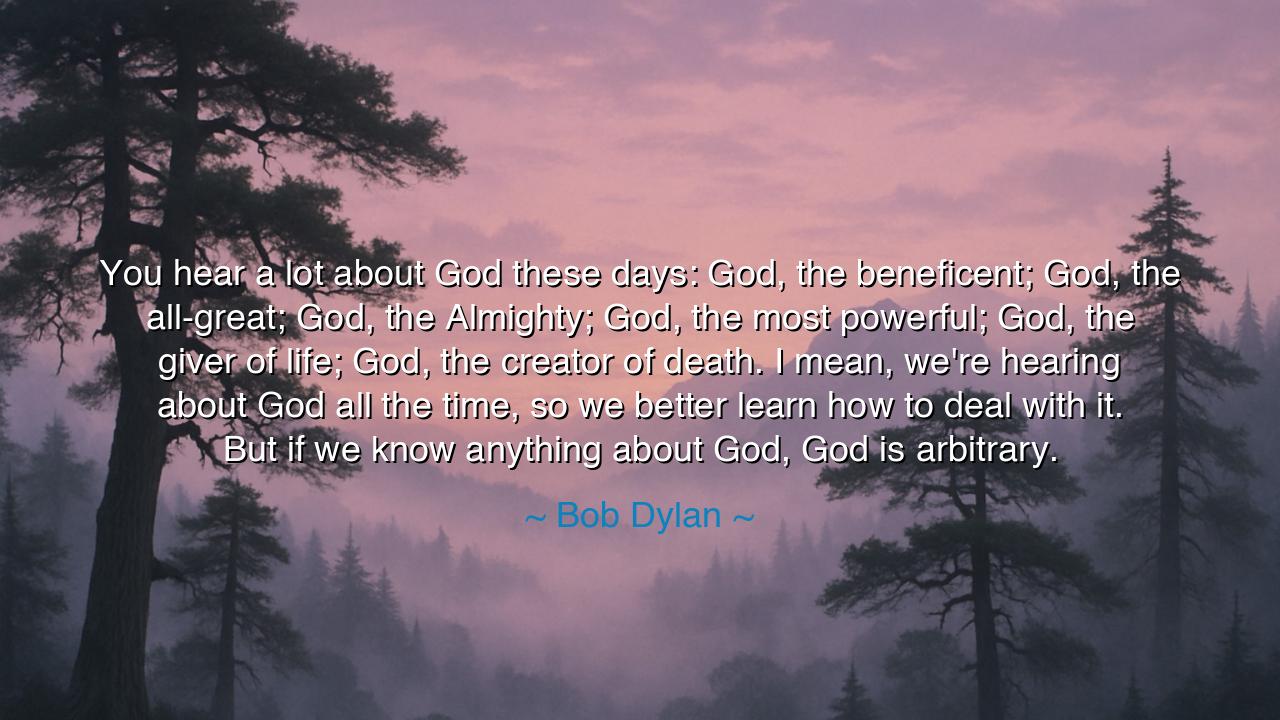
You hear a lot about God these days: God, the beneficent; God
You hear a lot about God these days: God, the beneficent; God, the all-great; God, the Almighty; God, the most powerful; God, the giver of life; God, the creator of death. I mean, we're hearing about God all the time, so we better learn how to deal with it. But if we know anything about God, God is arbitrary.






“You hear a lot about God these days: God, the beneficent; God, the all-great; God, the Almighty; God, the most powerful; God, the giver of life; God, the creator of death. I mean, we're hearing about God all the time, so we better learn how to deal with it. But if we know anything about God, God is arbitrary.” — thus spoke Bob Dylan, the wandering poet of America, whose voice, like a prophet’s cry from the wilderness, has long cut through the illusions of his age. These words, heavy with paradox, echo the eternal tension between faith and uncertainty, between the human desire for meaning and the divine mystery that refuses to be contained. When Dylan calls God arbitrary, he does not mock; he reveals the humbling truth that the divine will is beyond reason, and that to live wisely is to accept the wild, ungovernable rhythm of existence.
In every generation, men and women have sought to understand God, to name and define what lies beyond comprehension. We have called Him merciful, just, powerful, and good — but as Dylan reminds us, these are the names of comfort, the language of mortals trying to make the infinite familiar. Yet the world does not always behave according to our prayers. Storms strike the righteous and the wicked alike. The innocent suffer; the guilty prosper. The child dies while the tyrant reigns. Where, then, is the justice we imagine? Dylan’s words pierce that illusion: God is arbitrary, not in cruelty, but in the sense that the universe follows a design the human mind cannot grasp. What seems random to us may be the order of a higher truth.
The ancients knew this well. In the story of Job, the righteous man who lost all he had — his children, his wealth, his health — questioned the fairness of God. But when the voice from the whirlwind finally spoke, it did not explain. It only asked, “Where were you when I laid the foundations of the earth?” This was not cruelty; it was revelation. It taught that the divine is not bound by human fairness, and that wisdom begins when we cease demanding the universe to justify itself. Dylan, in his rough-hewn poetry, stands in this same tradition: the voice of the modern Job, still asking questions in the ruins of faith, still marveling at the power that creates and destroys without reason we can comprehend.
In the long journey of humankind, faith has always been born of bewilderment. When the plagues struck Egypt, when the flood swept over the world, when the atom split and fire fell from the sky — people turned upward, asking “Why?” The sages of the East answered with silence, saying that all is Maya, illusion, and that the divine moves like the wind — free, unpredictable, unstoppable. The prophets of the West declared that God’s thoughts are not our thoughts, that even chaos serves a purpose unseen. Dylan, poet of the in-between, gives voice to the same truth in the language of his age: that the sacred cannot be tamed by doctrine or reason. God’s mercy may lift one man and strike another; the same hand that creates life also destroys it. Such is the mystery that humbles kings and saints alike.
To call God arbitrary is not to deny the divine, but to free the soul from false certainty. It is to recognize that life, like God, cannot be predicted or controlled. The ancients called this humility — the awareness that man is not the master of destiny, but its witness. The wise do not curse the storm; they learn to sail upon it. Dylan’s words remind us that we “better learn how to deal with it” — that to live meaningfully in a world ruled by mystery, one must cultivate endurance, compassion, and awe. The arbitrary nature of existence is not a punishment; it is the fire in which faith is tested and purified.
Think of Viktor Frankl, who endured the hell of Auschwitz and yet emerged speaking not of despair, but of meaning. He saw men die beside him, not for lack of food or air, but for lack of hope. In the face of arbitrary suffering, he chose not to ask why, but how — how to endure, how to remain human, how to find purpose even when the heavens were silent. In this, he embodied Dylan’s truth: the world may make no sense, but we are not powerless. Our task is not to explain the divine, but to respond to its mystery with courage and grace.
So, O listener of tomorrow, learn from this: life will not follow your plan, nor will God conform to your reason. Do not despair when the heavens are silent; do not curse the randomness of fate. Instead, seek meaning within the storm. Nurture what you can control — kindness, truth, creation — and release what you cannot. For if God is indeed arbitrary, then every breath, every sunrise, every act of love is a miracle beyond calculation. Dylan’s words are not of defeat, but of freedom: when we accept the unpredictability of the divine, we are no longer bound by fear. We become pilgrims in a mysterious world — walking humbly, loving fiercely, and trusting that even in the seeming chaos, there is a music older than reason, and more beautiful than understanding.






AAdministratorAdministrator
Welcome, honored guests. Please leave a comment, we will respond soon